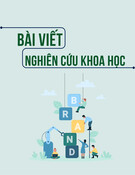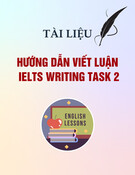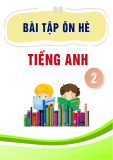
TNU Journal of Science and Technology 230(04): 120 - 128
http://jst.tnu.edu.vn 120 Email: jst@tnu.edu.vn
INSIGHTS INTO PEER SUPPORT IN ENGLISH LANGUAGE LEARNING:
EFL STUDENTS' PERSPECTIVES
Chu The Le Hoang1, Tran Quoc Thao2
*
1
Ho Chi Minh City University of Law
,
2
Ho Chi Minh City Open University
ARTICLE INFO ABSTRACT
Received:
12/12/2024
The objective of this qualitative research is to investigate the intricate
role that peer support plays in enhancing the outcomes of English
language acquisition. The study conducts in-
depth interviews with six
students to EFL students' perspectives of peer support in English
language learning. The findings suggest that emotional support is a
factor in the establishment of a constructive learning environment,
which in turn enhances both motivation and resilience. Tutoring and
other forms of collaborative le
arning are two examples of academic
assistance that significantly improve students' capacity to grasp and
retain the material they are studying. It is also possible that the offer
of mentoring from peers may support the development of essential
skills such as communication, collaboration, and critical thinking to a
greater extent. After completing the study, the researchers concluded
that peer support is a highly valuable resource for language learners.
This is because peer support provides a multitude of b
enefits that go
beyond the realm of academic achievement.
Revised:
04/3/2025
Published:
04/3/2025
KEYWORDS
Peer support
Student achievement
English language
Interaction
English learners
NHỮNG GÓC NHÌN MỚI VỀ SỰ HỖ TRỢ ĐỒNG ĐẲNG
TRONG VIỆC HỌC TIẾNG ANH: QUAN ĐIỂM CỦA SINH VIÊN TIẾNG ANH
NHƯ MỘT NGOẠI NGỮ
Chu Thế Lê Hoàng
1
, Trần Quốc Thao
2
*
1
Trư
ờ
ng
Đ
ạ
i
h
ọ
c Lu
ậ
t Thành
p
h
ố
H
ồ
Chí
Minh
,
2
Tr
ư
ờ
ng
Đ
ạ
i
h
ọ
c M
ở
T
hành ph
ố
H
ồ
Chí Minh
THÔNG TIN BÀI BÁO TÓM TẮT
Ngày nhận bài:
12/12/2024 Mục tiêu của nghiên cứu định tính này là khảo sát vai trò phức tạ
p
của sự hỗ trợ từ bạn bè trong việc nâng cao kết quả học tập tiế
ng
Anh. Nghiên cứu tiến hành các cuộc phỏng vấn sâu vớ
i sáu sinh viên
để hiểu rõ quan điểm của sinh viên học tiếng Anh như một ngoạ
i
ngữ. Kết quả cho thấy sự hỗ trợ về mặt cảm xúc là một yếu tố
quan
trọng trong việc tạo ra môi trường học tập tích cực, từ đó thúc đẩy cả
động lực và khả năng phục hồi. Hỗ trợ học tập, chẳng hạn như việ
c
kèm cặp và các hình thức học tập hợp tác khác, là hai ví dụ về sự hỗ
trợ học thuật giúp cải thiện đáng kể khả năng hiểu và ghi nhớ kiế
n
thức của sinh viên. Ngoài ra, việc nhận được sự cố vấn từ bạ
n bè có
thể hỗ trợ phát triển các kỹ năng quan trọng như giao tiếp, hợ
p tác và
tư duy phản biện ở mức độ cao hơn. Sau khi hoàn thành nghiên cứ
u
luận rằng sự hỗ trợ từ bạn bè là một nguồn lực vô cùng giá trị đối vớ
i
người học ngôn ngữ. Điều này là do sự hỗ trợ từ bạn bè mang lạ
i
nhi
ề
u l
ợ
i ích vư
ợ
t xa thành tích h
ọ
c t
ậ
p.
Ngày hoàn thiệ
n:
04/3/2025
Ngày đăng:
04/3/2025
TỪ KHÓA
Hỗ trợ đồng đẳng
Thành tích sinh viên
Ngôn ngữ tiếng Anh
Sự tác động lẫn nhau
Học viên tiếng Anh
DOI: https://doi.org/10.34238/tnu-jst.11683
* Corresponding author. Email: thao.tq@ou.edu.vn

TNU Journal of Science and Technology 230(04): 120 - 128
http://jst.tnu.edu.vn 121 Email: jst@tnu.edu.vn
1. Introduction
English plays a crucial role in various fields, including economics and politics, in countries
worldwide. For Vietnam, it presents a significant opportunity for the younger generation to
develop in all professions that are closely related to the current international labor market.
Moreover, according to Vu [1], English is not only a communication tool but also a key to
unlocking job opportunities and career advancement in the era of globalization. Meanwhile,
Pham [2] argues that English is not only a vital language in Vietnam's international integration
process but also a primary language taught in the Vietnamese education system, especially at the
college and university levels. Thus, the role of teaching and learning specialized English in
universities and colleges is currently immense and decisive for the quality of international
integration. Furthermore, English will serve as a gateway to early job opportunities for fresh
graduates, as suggested by Tran [3].
The teaching of English language in Vietnamese universities and colleges has experienced
substantial improvements in recent years. Nonetheless, several constraints persist. Hoang [4]
emphasizes that the English proficiency of prospective university and college students remains
comparatively low, which presents challenges for effective teaching. Moreover, several
instructors persist in using conventional pedagogical approaches, emphasizing grammar and
vocabulary at the expense of fostering communication skills, as noted by Nguyen [5]. A
fundamental problem is that graduates' English competence often does not meet employers'
expectations, as noted by Trinh [6].
In recent years, especially in the context of globalization, peer support a method of learning in
which students help one another out has become more popular in Vietnam's higher education
institutions. According to Vu [7], this method gives students more chances to speak English,
which improves their ability to communicate practically. The confidence of students in their
ability to use English is bolstered by the support and encouragement of their peers, as per
Songsiri [8]. Furthermore, Do [9] posits that peer support fosters students' self-directed learning,
research capabilities, and problem-solving skills, consequently augmenting their comprehension
of information. Newton [10] asserts that peer support cultivates an open and amicable learning
atmosphere, allowing students to feel at ease with making errors and eager to learn.
Peer support is a study subject garnering heightened interest within the domain of higher
education. Previously and contemporary research has shown several substantial advantages of
this methodology for students, particularly in enhancing academic achievement and cultivating
soft skills. Specifically, Tran [3] has pointed out that several elements affect non-English majors'
English language acquisition, such as learners' requirements, instructors, learning environment,
materials, motivation, and future career. Furthermore, Truong [11] contends that motivation is the
principal element influencing students' performance in English language acquisition. Saito [12]
underscores the importance of happy emotions, as they enhance both cognitive and motivational
dimensions of foreign language acquisition while also fostering general pleasure. Consequently,
several elements, such as family, friends, and teachers, impact any successful learning pursuit.
Newton [10] posited that "peer support" is a collaborative educational process in which students
aid one another in mastering a topic, irrespective of their social standing. It may also be
characterized as the transmission of experience and information from one person to another.
Although all studies agree on the role of peer collaboration in the educational process, it has been
defined variably by different scholars. Whitman [13] originated the phrase "near-peer teaching,"
but Iwata [14] characterized this procedure as "peer tutoring." Nonetheless, Manning [15]
favored the phrase "peer support." The essential framework of peer support entails partnering a
less proficient student with a more accomplished counterpart to enhance the former's academic
achievement without the imposition of authority, such as that of a teacher. However, as Tella [16]
underscores, peer support should not replace teacher education but rather function as an adjunct.

TNU Journal of Science and Technology 230(04): 120 - 128
http://jst.tnu.edu.vn 122 Email: jst@tnu.edu.vn
Schleyer [17] posits that using peer support in several dimensions helps bolster students' self-
confidence, communication abilities, and feelings of accountability, and creates a more
conducive learning atmosphere. This research seeks to investigate EFL students' beliefs and
practices about peer support in English language acquisition. The research will provide ideas to
enhance existing teaching techniques and increase students' English language competency based
on the results.
2. Methodology
2.1. Participants
This study included interviews with a total of six students, comprising two female and four
male students. All participants were first-year students at the College of Technology and
Industrial Management in District 7, Ho Chi Minh City. The group consisted of two students
majoring in e-commerce, two students from the business administration department, and two
students from the accounting department. All students were between the ages of 18 and 20. Every
participant attended an English class taught by the same teacher during the experiment. All
students who participated in the interview had an average English score of 8.0 or higher.
2.2. Data collection instruments
According to Mackey [18], interviews are a common instrument for qualitative research
because they enable researchers to explore difficult-to-observe phenomena and triangulate data
sources. Peer cooperation is a complex learning environment that cannot be fully understood by
evaluating friendship-interaction conversation data. Interviews, then, may be a valuable source of
information on participants' perceptions of pair work as well as the difficulties they had when
completing the task. The 18 interview questions were categorized into three main themes:
Emotional Support, Academic Assistance, and Skill Development.
2.3. Procedure of data collection
The data collection process commenced approximately three weeks following the approval
granted by the head of the foreign language department at the institution. Participants involved in the
study were provided with a 5 to 10-minute preview of the interview questions, which were printed in
Vietnamese. Subsequently, each participant engaged in a 10 to 15-minute interview session.
To ensure a systematic approach, the researcher conducted interviews with two students per
week, scheduling them on two distinct days each week. Predominantly, these interviews took
place immediately after the conclusion of morning classes. Upon the completion of each
interview, the researcher presented the participants with a notebook as a token of appreciation.
The recording device utilized for capturing the interviews was a mobile phone equipped with a
recording function.
The structured nature of the data collection process facilitated the efficient gathering of
qualitative data, ensuring consistency and reliability across all interview sessions.
3. Results and Discussion
3.1. Results
3.1.1. Emotional Support
Emotional support plays a crucial role in an individual's overall well-being and mental health.
It involves providing empathy, care, and reassurance, helping individuals manage stress and
navigate challenging situations. The study of Ganster [19] indicates that emotional support can
act as a buffer against the adverse effects of stress, significantly improving resilience and
psychological health. In educational settings, emotional support from peers and teachers fosters a
positive learning environment, enhancing students' academic performance and social skills as

TNU Journal of Science and Technology 230(04): 120 - 128
http://jst.tnu.edu.vn 123 Email: jst@tnu.edu.vn
Wentzel [20]. This kind of support is essential in developing a sense of belonging and security,
which in turn promotes personal growth and development.
Providing support to peers struggling with English language learning often requires a delicate
approach. An accounting student suggested
“I would try to build a rapport with my friend and suggest we study together. If they were
reluctant, I would find other ways to assist them, such as providing study tips or offering help
with class assignments. This gradual and supportive approach can be beneficial for both
parties.” (S1)
Building positive relationships is facilitated by mutual respect. An accounting student
highlighted the importance of a supportive and encouraging approach, stating;
“To foster a positive learning environment, it is essential to avoid negative comparisons and
criticism when providing support to peers." (S5)
The majority of students expressed a consensus on providing support to their peers
experiencing difficulties in English language learning. This support often involved active
listening, offering encouragement, and developing tailored strategies. For instance, a business
administration student stated:
“I would thoroughly investigate the root cause of my friend's problem and create a specific,
simple plan to alleviate their academic stress. Additionally, I would share my own experiences
with similar challenges.” (S3)
Trust is a crucial factor in peer support. If a peer declines assistance, it may indicate a lack of
trust in the helper's abilities. An e-commerce student explained:
“While I would respect my friend’s decision, I would also acknowledge that there might be
underlying reasons for their hesitation. I would be prepared to offer support again in the future if
the circumstances changed.” (S2)
When conflicts arise during peer support, it is important to de-escalate the situation and find a
mutually agreeable solution. One business administration student suggested:
“'If a disagreement arises, I would suggest taking a short break to calm down and re-evaluate
the situation. For minor issues, I might try to lighten the mood with humor. For more serious
problems, I would suggest temporarily pausing our activities to avoid further escalation.” (S4)
Emotional support plays a crucial role in facilitating effective peer-to-peer language learning.
By providing empathy, encouragement, and understanding, peers can create a supportive learning
environment that promotes both academic and personal growth.
As highlighted by the findings, students recognize the importance of building strong
relationships based on trust and respect. Effective communication, active listening, and
constructive feedback are key components of fostering positive interactions. By tailoring support
strategies to individual needs and preferences, students can maximize the effectiveness of peer
support. However, challenges such as personality clashes, time constraints, and differing learning
styles can hinder the effectiveness of peer support. To overcome these challenges, it is important
to establish clear expectations, maintain open communication, and practice empathy. By
addressing these issues proactively, students can create more effective and supportive learning
relationships. To summarize, peer assistance is a crucial resource for language learners. Students
can improve their language skills and academic performance by creating a happy learning
atmosphere, offering emotional support, and encouraging teamwork.
3.1.2. Academic Assistance
Academic assistance is pivotal in helping students navigate their educational pathways,
providing essential support that enhances learning and achievement. Topping [21] indicated peer
tutoring and collaborative study sessions significantly improve students' comprehension and
retention of material. This form of support encompasses tutoring, access to educational resources,
and structured study groups, which collectively foster an environment conducive to learning and

TNU Journal of Science and Technology 230(04): 120 - 128
http://jst.tnu.edu.vn 124 Email: jst@tnu.edu.vn
collaboration as Johnson [22]. Furthermore, academic assistance has been shown to boost
students' confidence and performance, particularly in challenging subjects, by providing tailored
help and continuous feedback as Kulik [23]. These resources empower students to overcome
academic challenges and reach their full potential.
Participants emphasized the importance of tailoring learning experiences to individual needs.
One business administration student explained:
“I would conduct research to identify my friend's learning style and preferences, and then
create a personalized learning plan. For instance, if my friend is extroverted, I might suggest
engaging in conversational activities, while for an introverted friend, I would provide structured
materials and opportunities for one-on-one discussion.' This highlights the significance of
flexibility and adaptability in peer support.” (S1)
Setting clear boundaries is essential in providing effective peer support. An accounting
student explained:
“It is important to avoid crossing personal boundaries and to focus solely on academic
assistance. Negative comments or personal attacks can undermine the supportive relationship
and hinder the learning process.” (S3)
Participants emphasized the importance of active listening in fostering effective peer support.
An e-commerce student stated,
“Listening is a cornerstone of effective communication and plays a vital role in building
strong relationships. By actively listening to our peers, we can better understand their needs and
challenges, thereby providing more targeted and effective support.” (S2)
Peer feedback plays a crucial role in fostering a collaborative and supportive learning
environment. An accounting student highlighted the importance of sharing new knowledge and
insights with peers, stating:
“Whenever I come across new methods or trends that could be beneficial to my peers, I try to
apply them to real-life examples that they can relate to. By providing practical examples and
guidance, I aim to make the new information more accessible and memorable.” (S5)
When faced with a non-compliant peer, it is important to address the issue directly and
establish clear expectations. An e-commerce student stated,
“If a peer is not fulfilling their responsibilities, I would have a serious conversation with them
about the importance of teamwork and mutual respect. If the situation persists, I would focus on
my own work and collaborate with other team members who are committed to the group.” (S4)
The present research emphasizes the critical importance of peer support in improving
academic performance and creating a happy learning environment. By providing tailored
assistance, constructive feedback, and emotional support, peers can significantly impact one
another's learning experiences. Effective peer support involves a combination of factors,
including active listening, empathy, and effective communication. It is crucial to establish clear
expectations, set boundaries, and maintain a respectful and supportive atmosphere.
However, challenges such as personality clashes, time constraints, and differing learning styles
can hinder the effectiveness of peer support. To overcome these challenges, it is important to
develop strong interpersonal skills, effective communication strategies, and a willingness to adapt
to different learning styles. By addressing these challenges and implementing effective strategies,
peer support can be a powerful tool for enhancing student learning and academic success.
Furthermore, institutions can play a significant role in fostering a supportive learning
environment by providing opportunities for peer interaction, training students in effective peer
support techniques, and recognizing and rewarding peer support efforts. By investing in peer
support initiatives, institutions can create a more inclusive and collaborative learning community.
3.1.3. Skill Development
Skill development is a crucial component of personal and professional growth, equipping












![Tài liệu Từ vựng tiếng Anh Trung cấp [mới nhất]](https://cdn.tailieu.vn/images/document/thumbnail/2025/20250913/nguyentuan250421@gmail.com/135x160/99491757910839.jpg)
![Tài liệu Từ vựng Tiếng Anh theo chủ đề [mới nhất]](https://cdn.tailieu.vn/images/document/thumbnail/2025/20250913/namdhuet@gmail.com/135x160/83251757753810.jpg)



![Tài liệu Từ vựng tiếng Anh cho bé [chuẩn nhất/mới nhất]](https://cdn.tailieu.vn/images/document/thumbnail/2025/20250731/huadaithesang2509@gmail.com/135x160/18631754013896.jpg)








